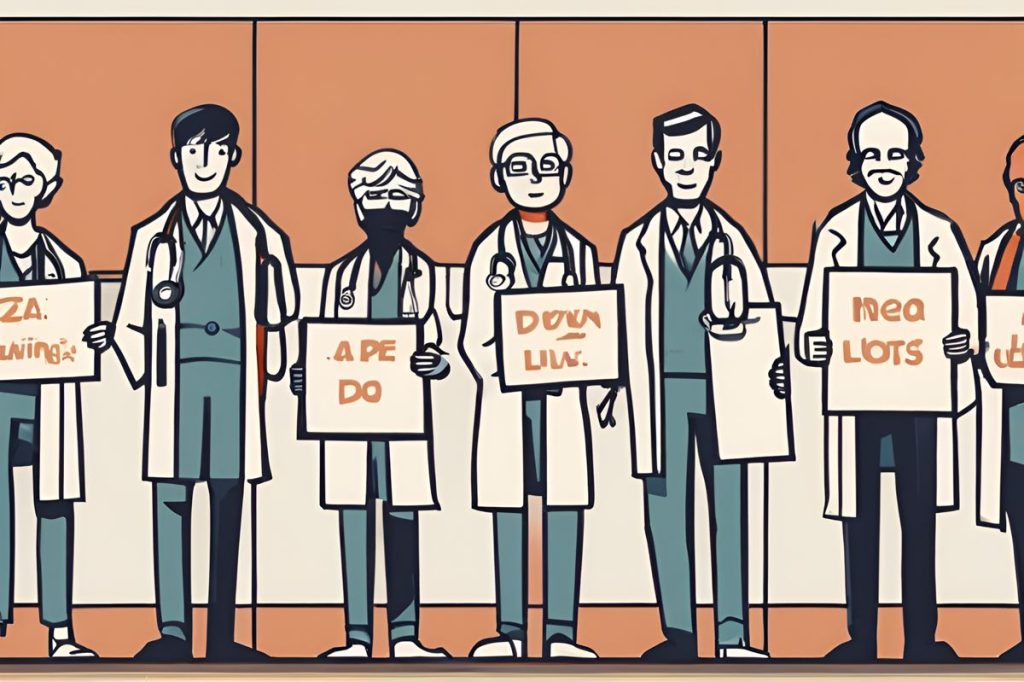Public hospital doctors are gearing up for a historic 48-hour strike, causing tension in healthcare. As negotiations with Okypy reach a stalemate, implications include potential A&E closures and increased reliance on private providers. The dispute over pay and incentives calls for Health Ministry intervention as doctors advocate for fair treatment and acknowledgment of their vital role.
What are the implications of the public hospital doctors’ strike in the healthcare system?
Public hospital doctors plan a historic 48-hour strike, causing tensions in healthcare. Implications include potential A&E closures, increased reliance on private providers, and a critical need for fair treatment and compensation acknowledgment. The dispute over pay and incentives calls for Health Ministry intervention as doctors advocate for their rights and the public’s well-being.
Impending Strike and Its Implications
Public hospital doctors are set to initiate a 48-hour work stoppage next week, a move not seen for two decades. The decision comes after a stalemate in negotiations with the state’s health services body, Okypy. As tensions rise, the medical community braces for impact. July 2nd and 3rd will mark the days when healthcare professionals take a stand, threatening even more severe actions, such as the potential closure of Accident & Emergency (A&E) departments.
Sotiris Koumas, the head of the Pasyki union, expressed the gravity of the situation to CNA, noting the historical significance of such an extensive strike. While the possibility of shutting down A&E services remains a contentious issue, Koumas highlighted alternative private providers available to the public. In the coming hours, unions such as Pasydy and Pasyki anticipate releasing a formal statement regarding their action plan.
Unresolved Dispute and Okypy’s Stance
At the heart of the dispute is a disagreement over doctors’ compensation. Okypy’s recent proposal fell short of expectations, sparking outrage among medical professionals. Koumas criticized the offer as both insufficient and disrespectful. The discord centers on the perspective that Okypy has on the doctors’ role and their value, as evidenced by the contentious label of ‘productive units’ used in the proposal. Physicians argue that their work, which is critical to the healthcare system’s operation and financial health, is being undervalued.
The conflict extends to the interpretation of current pay agreements. Doctors allege that Okypy has misinterpreted these terms, particularly concerning the calculation of incentives. There are two incentive categories: horizontal, which are given to all doctors, and vertical, which are merit-based. The issue has been further complicated by disagreements on overtime compensation, an integral part of the horizontal incentives.
Call for Health Ministry Intervention
As the crisis unfolds, the involvement of higher authorities becomes more pressing. Koumas has called for the health minister’s direct intervention, despite the minister’s hospitalization. The urgency conveyed by the union’s head reflects a broader concern for public health and the future of state-run medical services. Koumas maintains that public hospitals are still under the state’s purview, and Okypy’s management is being called into question.
The healthcare system’s stability is at stake, with doctors and administrative boards locked in a challenging negotiation. The upcoming days are critical as both parties seek to navigate through the turmoil. The healthcare professionals’ unified stance signals a deep-set expectation for fair treatment and recognition of their vital contributions to society.
While the final outcome remains uncertain, the healthcare community stands firm in its commitment to advocate for its rights and ensure the public’s well-being. The impending strike not only serves as a protest but also as a stark reminder of the ongoing struggles within healthcare systems worldwide.
What are the implications of the public hospital doctors’ strike in the healthcare system?
Public hospital doctors plan a historic 48-hour strike, causing tensions in healthcare. Implications include potential A&E closures, increased reliance on private providers, and a critical need for fair treatment and compensation acknowledgment. The dispute over pay and incentives calls for Health Ministry intervention as doctors advocate for their rights and the public’s well-being.
What is the core of the dispute between public hospital doctors and Okypy?
The dispute revolves around disagreements over doctors’ compensation. Okypy’s proposal was deemed insufficient and disrespectful by medical professionals, leading to tensions. Doctors argue that their critical role in the healthcare system is undervalued, and there are conflicting interpretations of current pay agreements, particularly concerning incentives and overtime compensation.
Why is the involvement of the Health Ministry crucial in this escalating situation?
The involvement of the Health Ministry is crucial as the crisis between public hospital doctors and Okypy intensifies. Doctors are calling for direct intervention from the health minister to address the dispute and ensure fair treatment. The stability of the healthcare system is at stake, and higher authorities are needed to navigate through the turmoil and safeguard public health.
How are public hospital doctors preparing for the upcoming strike?
Public hospital doctors are gearing up for a 48-hour strike, marking a significant event not seen in two decades. Unions like Pasydi and Pasyki are finalizing their action plans and preparing to take a stand on July 2nd and 3rd. The potential closure of A&E departments looms as doctors advocate for their rights and demand recognition of their crucial role in society.

